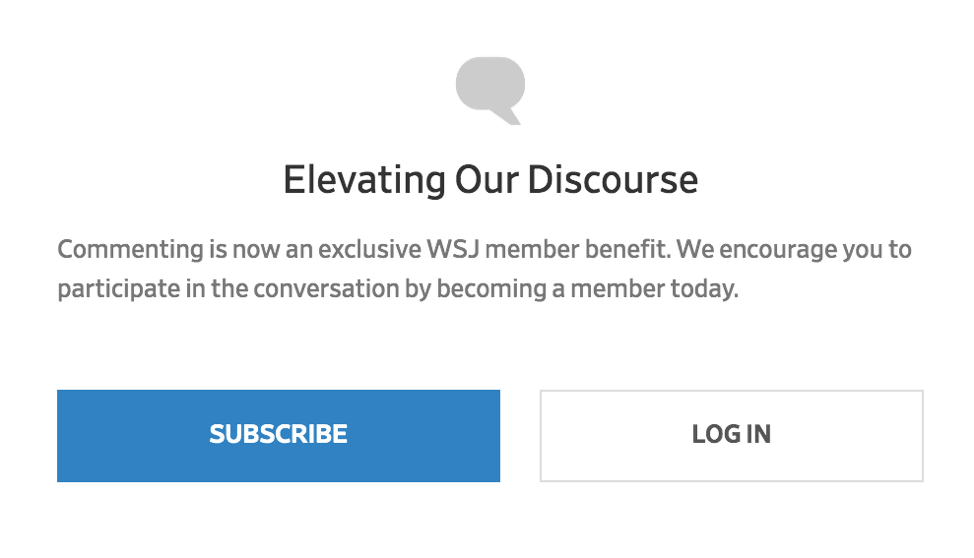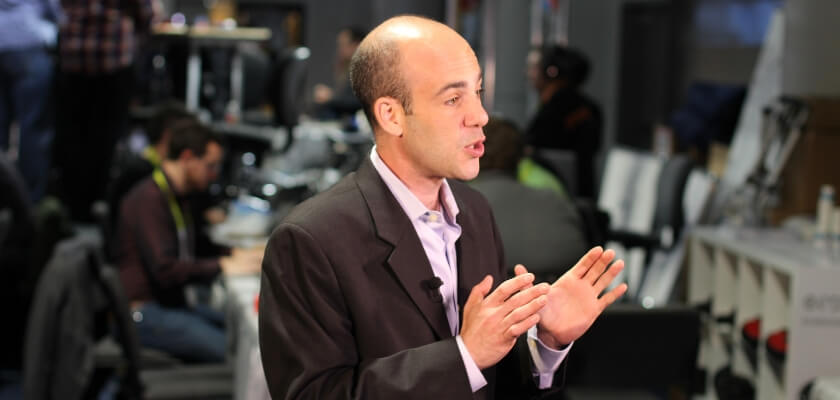When the The Wall Street Journal, published six days a week by Dow Jones & Company, claims that it is limiting public discussion to a select number of open articles, and only for 48 hour intervals, in the interest of keeping the editors and readers trained on the day’s top issues, imagine what that means practically. The day’s top issues should reflect the interest of the public through tracking what the American people are talking about and sharing, not be declared by an editorial staff. The newspapers are supposed to provide the public with the information that the public desires and can benefit from. They exist due to public interest, not to create it.
Visiting wsj.com, the lowly reader is greeted by this lovely pop up window:

A bold welcome to their website, WSJ wastes no time making it abundantly clear they have no interest in freeloading and anonymous opinions. They only want premier comments from their incredibly tasteful readership, especially those who are willing to pay more than the $1 a month fee that they ask for. While removing the right to have a voice from readers, WSJ promises that it can deliver the most relevant stories of the days, freshly cherry picked by their excellently paid staff daily.
On its front page is an article which headline reads “Is 66 Too Late to Skate? Not at All”, smartly placed next to the charming piece “Feeding a Family isn’t a Job for Mothers Alone”. Another article aims to tell the heartwarming story about how a Chinese doctor embarked the noble quest of editing the genes of fetuses, turning the harrowing reality of CRISPR babies into a fun story of medical rebellion.
These are the topics which the staff at the WSJ thinks are appropriate to show as the most important issues of the day, yet it is only the article about gene editing which features one of WSJ’s exclusive subscribers only comment sections.
Meanwhile on Dissenter’s ‘dumpster fire’ section, stories from the BBC and The Guardian have the public’s attention. BBC’s “UKIP candidate to be investigated over Jess Phillips rape ‘joke’” has awoken interest, with 88 dislikes and 174 comments on Dissenter, although the article itself is too cowardly to feature a comment section.
The UKIP candidate is of course Carl Benjamin, otherwise known as Sargon of Akkad, and his story has been covered by Reclaim the Net’s Tom Parker. Naturally the public would be interested in this figure being treated unfairly by the legacy media, as Sargon is more popular with the public than traditional media is. This is why the legacy media only allow smears of popular internet personalities in their publication, and never have open comment sections on such distasteful pieces.
The WSJ did something similar to Pewdiepie when they released their smear pieces, also similarly disinterested in the public reaction. Pewdiepie remains one of the most beloved creators on YouTube, by fans and creators alike.
None of the WSJ’s hit pieces were effective because they do not command the same audience which follows Pewdiepie, nor do they have the trust of that audience. These rags have no interest in the respect that the public has for popular internet personalities. Instead the legacy media wants to disparage the new media in a wicked and feeble attempt to earn back the readership print media has been hemorrhaging for years.
Another article to interest the public, earning 84 dislikes and 104 comments on Dissenter, was “’I’m getting death threats,’ says man who threw milkshake on Tommy Robinson,” published by The Guardian. This article was written in an utterly sympathetic light for a young man, Danyaal Mahmuh, who threw a drink over Robinson.
The establishment media has no interest in what the public thinks or feels. They want to control the narrative and promise that Marine Le Pen would ruin France, and that Tommy Robinson is little more than a terrorist. For the drivel on their front pages to matter then Carl Benjamin and Mark Meechan must be Nazis, or else people might realize that the progressives are the only ones who enact Nazi tactics. The legacy worldview has nothing to do with news, and everything to do with the future they want to force into being, like the idealistic Nazis and Soviets less than a century ago.
Instead of allowing the public to speak on their platforms as equals to the staff, publications like The Chicago Sun-Times, which disabled their comments as early as April 12, 2014, believe that these conversations are better had on social media, such as Facebook and Twitter. Reuters outright said as much on November 7 2014, as Dan Colarusso, executive editor of Reuters, wrote “Those communities offer vibrant conversation and, importantly, are self-policed by participants to keep on the fringes those who would abuse the privilege of commenting.” Two weeks later Recode shut down their comment sections, sharing a similar sentiment to Reuters.
These papers act like they’re too good to deal with the opinions of the public, especially those evil people who don’t believe directly in the progressive status quo. Instead of finding joy in offering a platform to bridge the divide between the American public, these papers would rather corral the public into progressive-ran behemoths Facebook and Twitter, both of which have been guilty of shadow banning and doing everything in their power to ruin conservatives’ careers.
It would have been too distasteful for CNN or WSJ to have to prune the opinions of the public themselves, they’d rather have their ideological lackeys at Facebook and Twitter clean up the filthy rabble for them. Thus, those publications locked their doors and forced the conversation off their sites and onto the social media networks.
One of the first issues to provoke this reaction by the elitist media was after Germany prostrated themselves for the promise that anti-refugee sentiment was only mere hate speech.
After this mistake by the titan of the EU, the public was rife with criticism for the government that claims to be acting within the interests of the German public. According to Vox, several top publications closed their comment sections in response to comments on coverage of the German government’s prostration. The publications did so to ‘silence the haters’. Another phrasing could be to ‘silence the public’.
This strategy of removing public input is becoming more common by the week, and even YouTube has experimented with limiting the comment section on their platform. It is a concerning era for the public as our media does not want to allow for itself to be fact checked or criticized.
In the era of fake news shutting down comment sections can only be a sign of bad faith, as we must be able to discuss the research that goes into every article. If the public doesn’t trust something then it is a wonderful opportunity to explain the source material further, or admit that there is no foundation for the claims being made.
Without input from the public, publications are free to push whatever material they want, regardless if it’s well-informed or filled with lies. They want to clean up their sites from the comments of the people because they want a cleaner presentation for the agendas that they push. It’s a play for even further control by the liberal elite.
These publications have no respect for Americans, and especially not conservatives. They see the true status quo as a mistake, and want to be able to push their ideas without having to deal with rational opposition. Instead of discussing politics, these papers want to discuss dreams, and shake at the idea of having to explain themselves.
Dissenter stands alone as the platform which is spreading public input across the internet. Every URL gets its own comment section through Dissenter, and so there is no way to truly lock out the discussion of the public anymore.
These papers can try to limit their platforms so only the chosen may speak, but we, the people, will always find a way to work around tyranny. The most important discussions are had by millions of people, not a select few. It will be with the comment sections that the future sides, not with the guardians of the progressive lexicons.












